八下Unit 3 Could you please clean your room? 单元知识点复习(共34张PPT)
文档属性
| 名称 | 八下Unit 3 Could you please clean your room? 单元知识点复习(共34张PPT) | 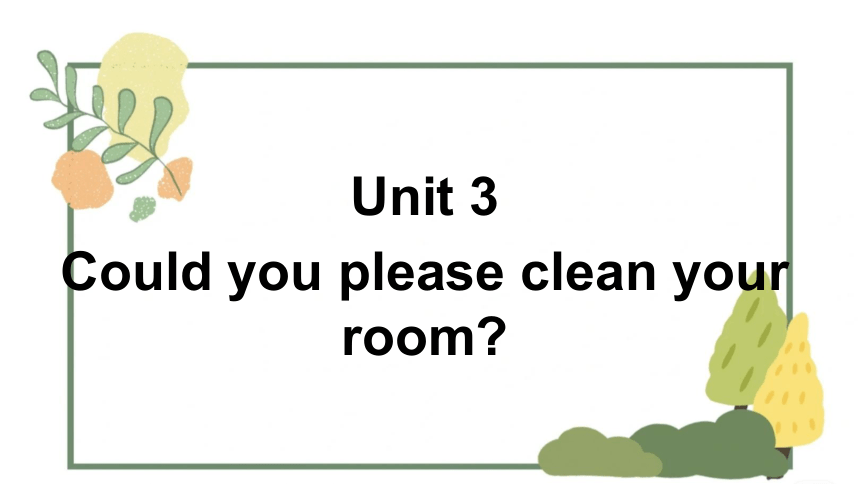 | |
| 格式 | zip | ||
| 文件大小 | 367.9KB | ||
| 资源类型 | 教案 | ||
| 版本资源 | 人教新目标(Go for it)版 | ||
| 科目 | 英语 | ||
| 更新时间 | 2023-04-07 15:58:02 | ||
图片预览

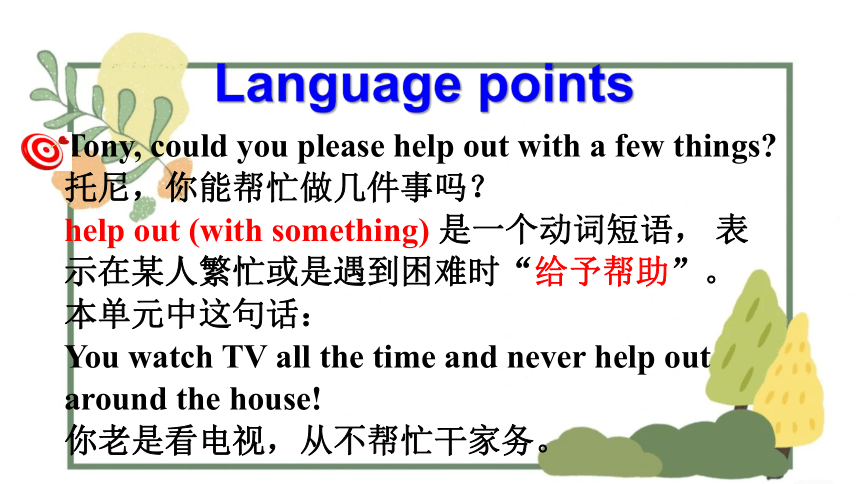


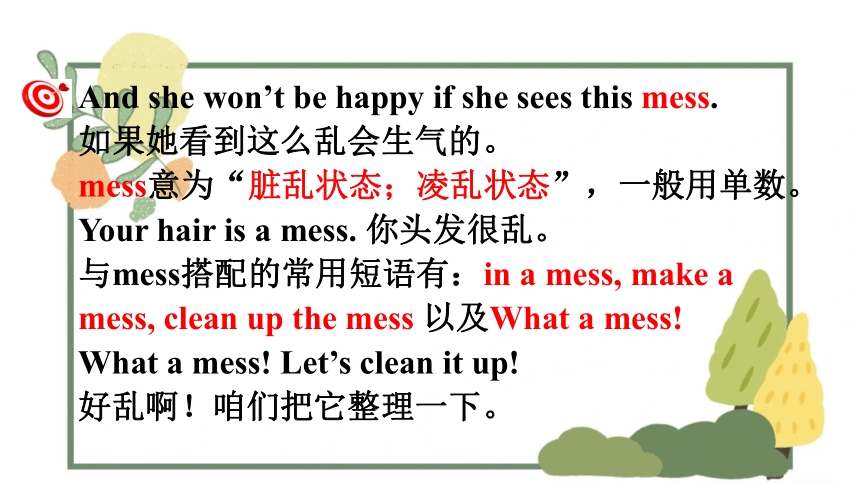
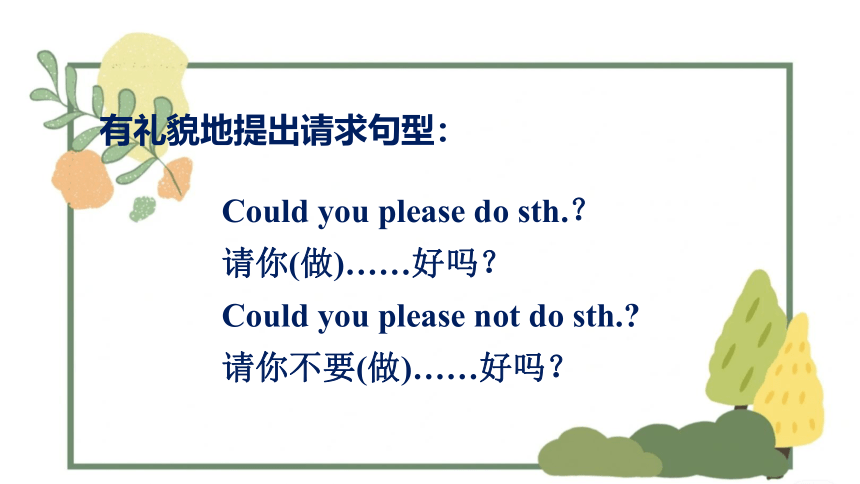
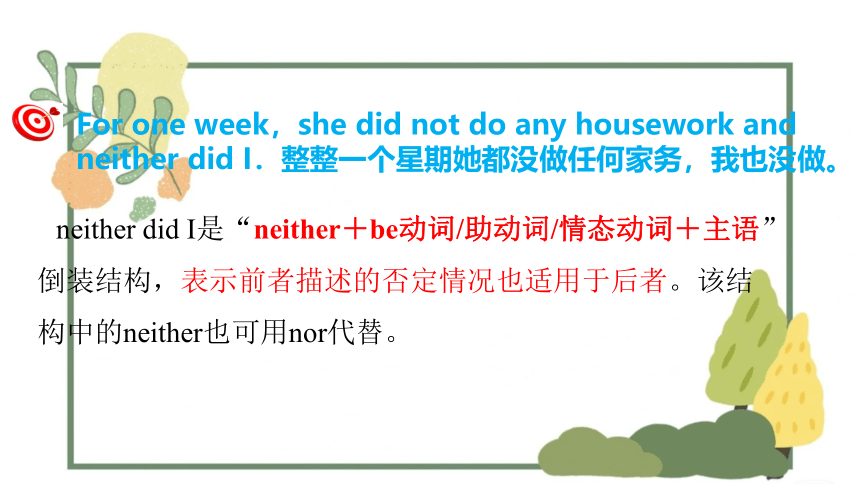
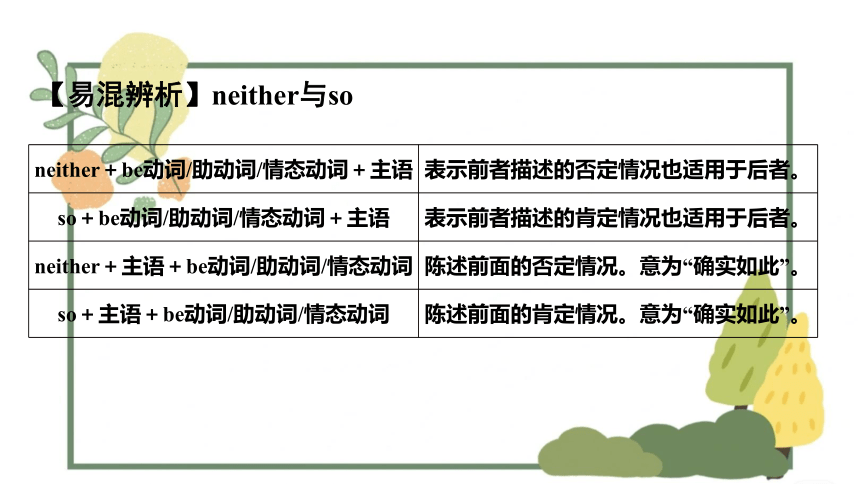

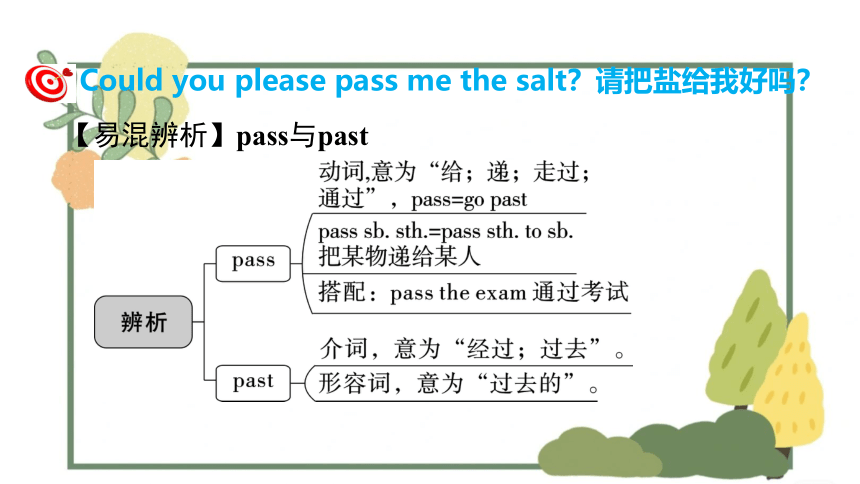
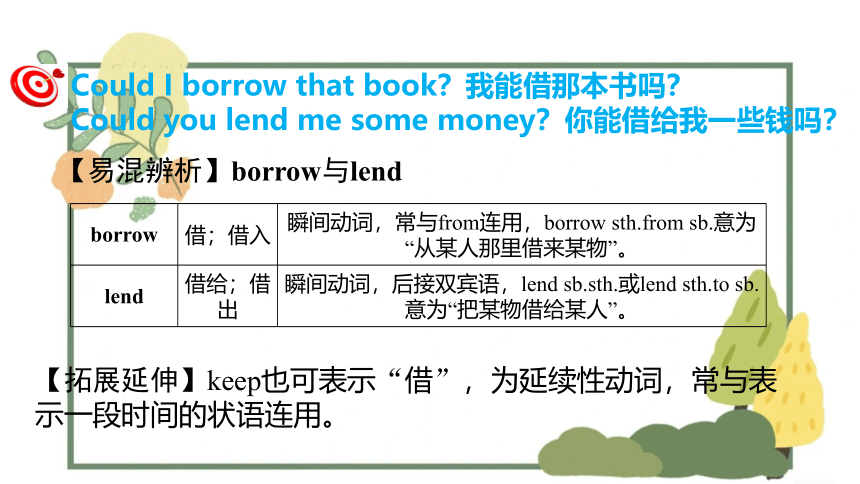
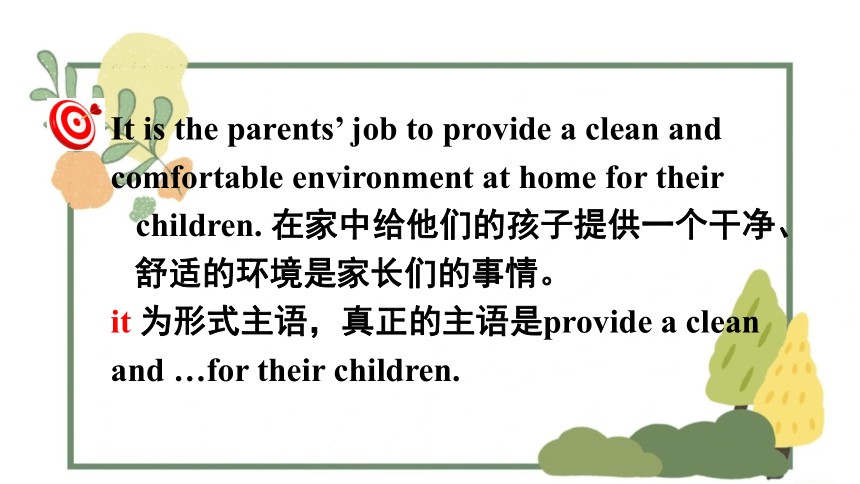
文档简介
(共34张PPT)
Unit 3
Could you please clean your room
Tony, could you please help out with a few things 托尼,你能帮忙做几件事吗?
help out (with something) 是一个动词短语, 表
示在某人繁忙或是遇到困难时“给予帮助”。
本单元中这句话:
You watch TV all the time and never help out
around the house!
你老是看电视,从不帮忙干家务。
Language points
I think two hours of TV is enough for you!
我认为你看两个小时电视就足够了!
此处,two hours of TV虽为复数,但却表达一种整体的观念。英语语法规定,当时间、长度、距离或其他可数名词表示一个完整的整体概念作主语时,其后的谓语动词用其单数形式。
Two months is quite a long time.
两个月是挺长的一段时间。
Thirty students is not a big number for a class.
30人对一个班来说算不上是大数目。
…because Mom will be back from shopping any minute now. …
因为妈妈随时都会买完东西回来。
any minute now 是一种常见口语表达,相当于“随时;马上;在任何时候”的意思,minute 还可替换为“second, moment, time”等。
e.g. we are expecting them any moment now.
我们期待他们随时到来。
And she won’t be happy if she sees this mess.
如果她看到这么乱会生气的。
mess意为“脏乱状态;凌乱状态”,一般用单数。
Your hair is a mess. 你头发很乱。
与mess搭配的常用短语有:in a mess, make a mess, clean up the mess 以及What a mess!
What a mess! Let’s clean it up!
好乱啊!咱们把它整理一下。
Could you please do sth.?
请你(做)……好吗?
Could you please not do sth.
请你不要(做)……好吗?
有礼貌地提出请求句型:
For one week,she did not do any housework and neither did I.整整一个星期她都没做任何家务,我也没做。
neither did I是“neither+be动词/助动词/情态动词+主语”倒装结构,表示前者描述的否定情况也适用于后者。该结构中的neither也可用nor代替。
【易混辨析】neither与so
neither+be动词/助动词/情态动词+主语 表示前者描述的否定情况也适用于后者。
so+be动词/助动词/情态动词+主语 表示前者描述的肯定情况也适用于后者。
neither+主语+be动词/助动词/情态动词 陈述前面的否定情况。意为“确实如此”。
so+主语+be动词/助动词/情态动词 陈述前面的肯定情况。意为“确实如此”。
“What happened ” she asked in surprise.
他惊讶的问道:“发生什么事情了?”
介词短语 in surprise 表示状态,意思是“吃惊地, 惊讶地”。 再如:
He looked at me in great surprise and asked for a
long while, “Don’t you just leave for Australia this
morning ” 他极其惊讶地看着我,好久才问道:
“你不是今早才离开去澳大利亚了吗?”
Could you please pass me the salt?请把盐给我好吗?
【易混辨析】pass与past
Could I borrow that book?我能借那本书吗?
Could you lend me some money?你能借给我一些钱吗?
【易混辨析】borrow与lend
borrow 借;借入 瞬间动词,常与from连用,borrow sth.from sb.意为“从某人那里借来某物”。
lend 借给;借出 瞬间动词,后接双宾语,lend sb.sth.或lend sth.to sb.意为“把某物借给某人”。
【拓展延伸】keep也可表示“借”,为延续性动词,常与表示一段时间的状语连用。
It is the parents’ job to provide a clean and comfortable environment at home for their
children. 在家中给他们的孩子提供一个干净、舒适的环境是家长们的事情。
it 为形式主语,真正的主语是provide a clean
and …for their children.
It’s one’s job (duty) to do something
看作一个固定句型,表示“做某事是
人的职责”
It is my job to clear the classroom today.
And anyway, I think doing chores is not so difficult. 反正我觉得干家务也不太难。
anyway 是个副词,置于句首时,其后常常用逗号与其他成分隔开。意为“反正,仍然,依然”
Sam didn’t get the job, but he is not unhappy
because it didn’t pay well anyway.
anyway还可以表示“不管怎样,无论如何”
It’s just a cold. But anyway you should still see the doctor.
The earlier kids learn to be independent, the better it is for their future.
孩子们越早学会独立,对他们的未来就越好。
“the +比较级+... ,the +比较级+...”表示
“越……,就越……”。又如:
The more he explained, the better we understood.
他解释的越多,我们就理解的越透彻。
They should spend their time on schoolwork in order to get good grades and get into a good university.为了取得好成绩并考上一所好大学,他们应该把时间花在功课上。
spend意为“花费;度过”,其主语是“人”。
常用结构:spend time/money (in) doing sth./on sth.表示“(在)做某事上花费时间/金钱”。
in order to意为“为了;目的是”,表示目的,后接动词原形,其否定形式为in order not to。它可位于句首或句中。
【拓展延伸】如果后接目的状语从句,则可用in order that或so that。
【易混辨析】spend,take,pay与cost
例词 主语 宾语 常用结构
spend 人 时间或金钱 sb. spend(s) some time/money on sth.某人在某物上花多少时间/钱sb. spend(s) some time/money (in) doing sth.某人花费多少时间/钱做某事
take it或物 时间 It takes sb. some time to do sth.做某事花费某人多少时间(doing) sth. takes sb. some time(做)某事花费某人多少时间
pay 人 金钱 sb. pay(s) some money for sth.某人为某物付多少钱
cost 物 金钱 sth. cost(s) (sb.) some money某物花费(某人)多少钱
Doing chores helps to develop children's independence… 做家务有助于培养孩子的独立能力……
develop 作动词,意为“发展;发育;成长”。其常见短语develop into意为“发展成为”;develop one's interest in…意为“培养某人对……的兴趣”。
【拓展延伸】
①development作名词,意为“发展;发达”,常构成短语 with the development of(随着……的发展)。
②developing作形容词,意为“发展中的”;developed作形容词,意为“发达的”。
As a result,he often fell ill and his grades dropped.结果他经常生病,成绩也下降了。
ill意为“有病;不舒服”。fall ill意为“生病”,fall是系动词,强调动态的过程。
【注意】ill的比较级为worse,最高级为worst。
【易混辨析】be ill与fall ill
be ill 生病(强调持续状态)
fall ill 生病(强调瞬间过程)
drop意为“落下;掉下”,既可作及物动词,也可作不及物动词。
【易混辨析】drop与fall
①drop和fall都可表示物体“落下;降落;降下”,作不及物动词时,一般可互换。drop还可以作及物动词,fall则不可以。
The temperature dropped/fell to zero the next day.
第二天温度降到了零度。
②drop 侧重指由于地心引力或没有握住等原因而“落下;使下落”;而fall侧重由于重力作用或失去平衡而跌倒。
只作情态动词的 can / could, may /
might, ought to, must
可情态可实义的 need, dare
可情态可助动词的 shall / should, will /
would
相当于情态动词的 have to, used to
情态动词的用法
情态动词的语法特征
情态动词不能单独做谓语, 除ought和have外, 后面只能接不带to的不定式。
情态动词没有人称, 数的变化, 但有些情态动词, 如can、will也有一般式和过去式的变化。
情态动词的“时态”形式并不是时间区别的主要标志, 不少情况下, 情态动词的现在式形式和过去式形式都可用来表示现在时间、过去时间和将来时间。
情态动词could的用法
1.用于提出要求或请求
“Could you please... ” 意为 “能请你……吗?”,用于提出要求或请求。
肯定回答:Yes, sure./Of cousre. 是的,当然可以
No problem. 没问题。
With pleasure. 乐意帮忙。
Sure./Of course./Certainly, I can. 当然可以。
否定回答:Sorry, I can't. I have to... 对不起,我不能,我得……
Sorry, I'm going to ... 对不起,我将……
I'm afraid I can’t. I have to... 我恐怕不能。我得……
I'm afraid not. 恐怕不行。
注意:肯定回答及否定回答中,均不用could,而是要用can代替could。
2.用于征得许可
“Could I... ”意为“我能……吗?”,用于请求对方允许自己做某事。
肯定回答:Yes, you can. / Of course you can. /Yes, please.
否定回答:Sorry, you can't. /I'm afraid you can't. /No, you mustn’t.
3.表示能力:could 表示过去的能力,表示现在的能力用can。此时could是can的过去式。
4.表示推测: 后接动词原形,表示对现在或将来的推测。
1. — Could you please give me a book
— .
A. Yes, I can’t. B. No, I can.
C. Yes, here you are. D. No, I don’t want to help you.
2. — Could you please clean the bike
— .
A. No, I am cleaning it. B. No, I can.
C. Yes, I can’t. D. Sorry, I am busy now.
C
D
Exercises
I. 单项选择。
3. These boxes are heavy. Could you____ them
A. carrying B. carry
C. to cry D. carries
4. I want ______ these things in the box.
A. put B. putting
C. to put D. puts
B
C
5. — Could I look at your pictures
— Yes, of course you ____.
A. could B. can C. will D. might
6. _______ you pass me a pen?I’d like to write
down the telephone number.
A. Need B. Could C. Must D. Should
B
B
II. 请根据汉语提示完成下列句子。
1. His sister has to ________________ (洗餐具) after dinner.
2. Could you please _________________ (叠衣服), Jenny
3. Ben likes to _______________ (打扫卫生).
4. Linda, help your mother ________________ (倒垃圾).
5. My brother hates to ___________(做家务).
do the dishes
fold the clothes
do the cleaning
take out the rubbish
do chores
III. 选词填空。
1. I ______ doing the dishes. It’s too boring.
2. I’m going to __________ my English project and then meet my friends.
hate
work on
hate,take care of,work on,use,forget
3. My mom gets really angry when I _______
to clean my room.
4. Can I ____ your dictionary, please Mine is
at home.
5. Could you ______________ my cat when
I’m on vacation
forget
use
take care of
hate,take care of,work on,use,forget
1. — Excuse me, Betty. Could you help me,
please
— ___________. Is this big box
2. — _____________________ your watch
—I think it is broken.
Certainly
What’s wrong with
IV. 根据语境, 写出适当的答语或问句。
3. — Thank you very much.
— _________________.
4. —_________________
—It’s a quarter to twelve.
5. — _________________________ to drink
—Yes. I’d like a glass of orange juice.
You’re welcome
What’s the time
Would you like something
Unit 3
Could you please clean your room
Tony, could you please help out with a few things 托尼,你能帮忙做几件事吗?
help out (with something) 是一个动词短语, 表
示在某人繁忙或是遇到困难时“给予帮助”。
本单元中这句话:
You watch TV all the time and never help out
around the house!
你老是看电视,从不帮忙干家务。
Language points
I think two hours of TV is enough for you!
我认为你看两个小时电视就足够了!
此处,two hours of TV虽为复数,但却表达一种整体的观念。英语语法规定,当时间、长度、距离或其他可数名词表示一个完整的整体概念作主语时,其后的谓语动词用其单数形式。
Two months is quite a long time.
两个月是挺长的一段时间。
Thirty students is not a big number for a class.
30人对一个班来说算不上是大数目。
…because Mom will be back from shopping any minute now. …
因为妈妈随时都会买完东西回来。
any minute now 是一种常见口语表达,相当于“随时;马上;在任何时候”的意思,minute 还可替换为“second, moment, time”等。
e.g. we are expecting them any moment now.
我们期待他们随时到来。
And she won’t be happy if she sees this mess.
如果她看到这么乱会生气的。
mess意为“脏乱状态;凌乱状态”,一般用单数。
Your hair is a mess. 你头发很乱。
与mess搭配的常用短语有:in a mess, make a mess, clean up the mess 以及What a mess!
What a mess! Let’s clean it up!
好乱啊!咱们把它整理一下。
Could you please do sth.?
请你(做)……好吗?
Could you please not do sth.
请你不要(做)……好吗?
有礼貌地提出请求句型:
For one week,she did not do any housework and neither did I.整整一个星期她都没做任何家务,我也没做。
neither did I是“neither+be动词/助动词/情态动词+主语”倒装结构,表示前者描述的否定情况也适用于后者。该结构中的neither也可用nor代替。
【易混辨析】neither与so
neither+be动词/助动词/情态动词+主语 表示前者描述的否定情况也适用于后者。
so+be动词/助动词/情态动词+主语 表示前者描述的肯定情况也适用于后者。
neither+主语+be动词/助动词/情态动词 陈述前面的否定情况。意为“确实如此”。
so+主语+be动词/助动词/情态动词 陈述前面的肯定情况。意为“确实如此”。
“What happened ” she asked in surprise.
他惊讶的问道:“发生什么事情了?”
介词短语 in surprise 表示状态,意思是“吃惊地, 惊讶地”。 再如:
He looked at me in great surprise and asked for a
long while, “Don’t you just leave for Australia this
morning ” 他极其惊讶地看着我,好久才问道:
“你不是今早才离开去澳大利亚了吗?”
Could you please pass me the salt?请把盐给我好吗?
【易混辨析】pass与past
Could I borrow that book?我能借那本书吗?
Could you lend me some money?你能借给我一些钱吗?
【易混辨析】borrow与lend
borrow 借;借入 瞬间动词,常与from连用,borrow sth.from sb.意为“从某人那里借来某物”。
lend 借给;借出 瞬间动词,后接双宾语,lend sb.sth.或lend sth.to sb.意为“把某物借给某人”。
【拓展延伸】keep也可表示“借”,为延续性动词,常与表示一段时间的状语连用。
It is the parents’ job to provide a clean and comfortable environment at home for their
children. 在家中给他们的孩子提供一个干净、舒适的环境是家长们的事情。
it 为形式主语,真正的主语是provide a clean
and …for their children.
It’s one’s job (duty) to do something
看作一个固定句型,表示“做某事是
人的职责”
It is my job to clear the classroom today.
And anyway, I think doing chores is not so difficult. 反正我觉得干家务也不太难。
anyway 是个副词,置于句首时,其后常常用逗号与其他成分隔开。意为“反正,仍然,依然”
Sam didn’t get the job, but he is not unhappy
because it didn’t pay well anyway.
anyway还可以表示“不管怎样,无论如何”
It’s just a cold. But anyway you should still see the doctor.
The earlier kids learn to be independent, the better it is for their future.
孩子们越早学会独立,对他们的未来就越好。
“the +比较级+... ,the +比较级+...”表示
“越……,就越……”。又如:
The more he explained, the better we understood.
他解释的越多,我们就理解的越透彻。
They should spend their time on schoolwork in order to get good grades and get into a good university.为了取得好成绩并考上一所好大学,他们应该把时间花在功课上。
spend意为“花费;度过”,其主语是“人”。
常用结构:spend time/money (in) doing sth./on sth.表示“(在)做某事上花费时间/金钱”。
in order to意为“为了;目的是”,表示目的,后接动词原形,其否定形式为in order not to。它可位于句首或句中。
【拓展延伸】如果后接目的状语从句,则可用in order that或so that。
【易混辨析】spend,take,pay与cost
例词 主语 宾语 常用结构
spend 人 时间或金钱 sb. spend(s) some time/money on sth.某人在某物上花多少时间/钱sb. spend(s) some time/money (in) doing sth.某人花费多少时间/钱做某事
take it或物 时间 It takes sb. some time to do sth.做某事花费某人多少时间(doing) sth. takes sb. some time(做)某事花费某人多少时间
pay 人 金钱 sb. pay(s) some money for sth.某人为某物付多少钱
cost 物 金钱 sth. cost(s) (sb.) some money某物花费(某人)多少钱
Doing chores helps to develop children's independence… 做家务有助于培养孩子的独立能力……
develop 作动词,意为“发展;发育;成长”。其常见短语develop into意为“发展成为”;develop one's interest in…意为“培养某人对……的兴趣”。
【拓展延伸】
①development作名词,意为“发展;发达”,常构成短语 with the development of(随着……的发展)。
②developing作形容词,意为“发展中的”;developed作形容词,意为“发达的”。
As a result,he often fell ill and his grades dropped.结果他经常生病,成绩也下降了。
ill意为“有病;不舒服”。fall ill意为“生病”,fall是系动词,强调动态的过程。
【注意】ill的比较级为worse,最高级为worst。
【易混辨析】be ill与fall ill
be ill 生病(强调持续状态)
fall ill 生病(强调瞬间过程)
drop意为“落下;掉下”,既可作及物动词,也可作不及物动词。
【易混辨析】drop与fall
①drop和fall都可表示物体“落下;降落;降下”,作不及物动词时,一般可互换。drop还可以作及物动词,fall则不可以。
The temperature dropped/fell to zero the next day.
第二天温度降到了零度。
②drop 侧重指由于地心引力或没有握住等原因而“落下;使下落”;而fall侧重由于重力作用或失去平衡而跌倒。
只作情态动词的 can / could, may /
might, ought to, must
可情态可实义的 need, dare
可情态可助动词的 shall / should, will /
would
相当于情态动词的 have to, used to
情态动词的用法
情态动词的语法特征
情态动词不能单独做谓语, 除ought和have外, 后面只能接不带to的不定式。
情态动词没有人称, 数的变化, 但有些情态动词, 如can、will也有一般式和过去式的变化。
情态动词的“时态”形式并不是时间区别的主要标志, 不少情况下, 情态动词的现在式形式和过去式形式都可用来表示现在时间、过去时间和将来时间。
情态动词could的用法
1.用于提出要求或请求
“Could you please... ” 意为 “能请你……吗?”,用于提出要求或请求。
肯定回答:Yes, sure./Of cousre. 是的,当然可以
No problem. 没问题。
With pleasure. 乐意帮忙。
Sure./Of course./Certainly, I can. 当然可以。
否定回答:Sorry, I can't. I have to... 对不起,我不能,我得……
Sorry, I'm going to ... 对不起,我将……
I'm afraid I can’t. I have to... 我恐怕不能。我得……
I'm afraid not. 恐怕不行。
注意:肯定回答及否定回答中,均不用could,而是要用can代替could。
2.用于征得许可
“Could I... ”意为“我能……吗?”,用于请求对方允许自己做某事。
肯定回答:Yes, you can. / Of course you can. /Yes, please.
否定回答:Sorry, you can't. /I'm afraid you can't. /No, you mustn’t.
3.表示能力:could 表示过去的能力,表示现在的能力用can。此时could是can的过去式。
4.表示推测: 后接动词原形,表示对现在或将来的推测。
1. — Could you please give me a book
— .
A. Yes, I can’t. B. No, I can.
C. Yes, here you are. D. No, I don’t want to help you.
2. — Could you please clean the bike
— .
A. No, I am cleaning it. B. No, I can.
C. Yes, I can’t. D. Sorry, I am busy now.
C
D
Exercises
I. 单项选择。
3. These boxes are heavy. Could you____ them
A. carrying B. carry
C. to cry D. carries
4. I want ______ these things in the box.
A. put B. putting
C. to put D. puts
B
C
5. — Could I look at your pictures
— Yes, of course you ____.
A. could B. can C. will D. might
6. _______ you pass me a pen?I’d like to write
down the telephone number.
A. Need B. Could C. Must D. Should
B
B
II. 请根据汉语提示完成下列句子。
1. His sister has to ________________ (洗餐具) after dinner.
2. Could you please _________________ (叠衣服), Jenny
3. Ben likes to _______________ (打扫卫生).
4. Linda, help your mother ________________ (倒垃圾).
5. My brother hates to ___________(做家务).
do the dishes
fold the clothes
do the cleaning
take out the rubbish
do chores
III. 选词填空。
1. I ______ doing the dishes. It’s too boring.
2. I’m going to __________ my English project and then meet my friends.
hate
work on
hate,take care of,work on,use,forget
3. My mom gets really angry when I _______
to clean my room.
4. Can I ____ your dictionary, please Mine is
at home.
5. Could you ______________ my cat when
I’m on vacation
forget
use
take care of
hate,take care of,work on,use,forget
1. — Excuse me, Betty. Could you help me,
please
— ___________. Is this big box
2. — _____________________ your watch
—I think it is broken.
Certainly
What’s wrong with
IV. 根据语境, 写出适当的答语或问句。
3. — Thank you very much.
— _________________.
4. —_________________
—It’s a quarter to twelve.
5. — _________________________ to drink
—Yes. I’d like a glass of orange juice.
You’re welcome
What’s the time
Would you like something
同课章节目录
- Unit 1 What's the matter?
- Section A
- Section B
- Unit 2 I'll help to clean up the city parks.
- Section A
- Section B
- Unit 3 Could you please clean your room?
- Section A
- Section B
- Unit 4 Why don't you talk to your parents?
- Section A
- Section B
- Unit 5 What were you doing when the rainstorm came
- Section A
- Section B
- Review of Units 1-5
- Unit 6 An old man tried to move the mountains.
- Section A
- Section B
- Unit 7 What's the highest mountain in the world?
- Section A
- Section B
- Unit 8 Have you read Treasure Island yet?
- Section A
- Section B
- Unit 9 Have you ever been to a museum?
- Section A
- Section B
- Unit 10 I've had this bike for three years.
- Section A
- Section B
